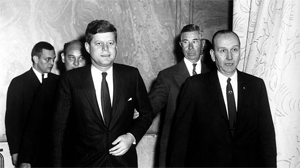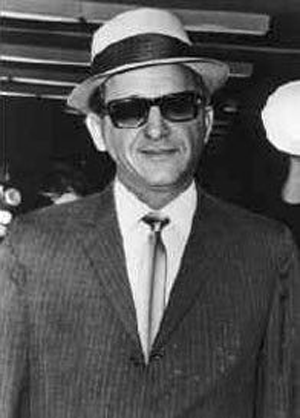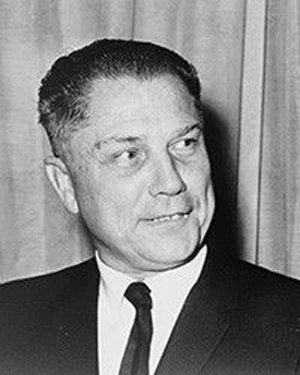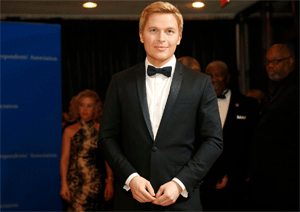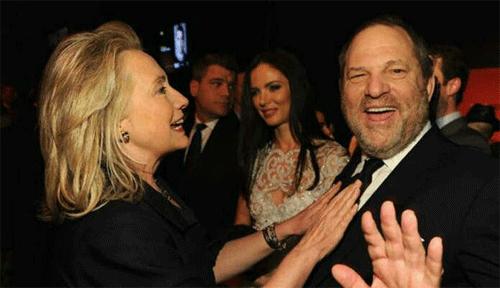All Thanks to Maxby Bob Weinstein
Vanity Fair
April, 2003
NOTICE: THIS WORK MAY BE PROTECTED BY COPYRIGHTYOU ARE REQUIRED TO READ
THE COPYRIGHT NOTICE AT THIS LINK BEFORE YOU READ THE FOLLOWING WORK, THAT IS AVAILABLE SOLELY FOR PRIVATE STUDY, SCHOLARSHIP OR RESEARCH PURSUANT TO 17 U.S.C. SECTION 107 AND 108. IN THE EVENT THAT THE LIBRARY DETERMINES THAT UNLAWFUL COPYING OF THIS WORK HAS OCCURRED, THE LIBRARY HAS THE RIGHT TO BLOCK THE I.P. ADDRESS AT WHICH THE UNLAWFUL COPYING APPEARED TO HAVE OCCURRED. THANK YOU FOR RESPECTING THE RIGHTS OF COPYRIGHT OWNERS.
Plenty of ink has been devoted to the rise of Miramax Films, the personalities of the two brothers who run it, and the company’s extraordinary run of Academy Award nominations. Now, in a deeply personal reflection, Bob Weinstein reveals the key to his and Harvey’s success: their father, Max, a diamond cutter whose dreams and passion for the movies turned two young boys from Queens into Hollywood’s most formidable team.In 1979 my brother, Harvey, and I founded Miramax Films, the company that we named in honor of our parents, Miriam and Max, and that we continue to run to this day. Harvey is the public face of Miramax, a role born out of the necessity to win recognition for the “art house” films we began our careers by distributing—films of high quality, but most of them sorely lacking in bankable stars. Harvey tapped into his inner showman and became the voice these small jewels needed to win the recognition they deserved.
My style is more low-key. Outside of the movie business I tend to be known as the “quiet brother,” which is fine by me. We have different means of working toward the same end, which have proved successful for 25 years. It actually works out for the best that only one of us likes the spotlight. There wouldn’t physically be enough room in it for both.
For the first 18 years, we pretty much worked on everything together. We had to agree on the buying of a film, otherwise it wasn’t bought. We then collaborated on the marketing, the distribution, and the thousands of other details that go into creating and running a movie company.
Over the last seven years, as the company has grown from 30 employees to more than 400, our roles have altered considerably.
My brother and I now choose and market our own films separately, Harvey under the Miramax banner, which has accumulated 176 Academy Award nominations, including a best-picture nomination an unprecedented 11 years in a row, as well as two winners, The English Patient and Shakespeare in Love. I created the Dimension banner, under which I produce the company’s more mainstream, commercial movies, such as the Spy Kids films, Scary Movie 1 and 2, The Others, and the Scream trilogy. Despite our different focuses, not a day goes by that we don’t speak to each other at least five times, to offer suggestions, ask advice, deal with business matters, and generally watch each other’s back. We remain partners in every way.
I offer the above as a brief overview of the company that has been our life’s work. When you are running a company, time for reflection is a luxury you can’t (or don’t) usually afford yourself, but
on this past Father’s Day my thoughts traveled back to our dad. Although he had died 26 years earlier and never lived to see a single film that Miramax produced, his influence extends far beyond merely lending his name to the company. His passions in life, from his love of movies and business to his belief in the importance of family, have infused our own personal and professional lives. Max Weinstein was more responsible than anyone else for the creation and success of Miramax Films, and I feel compelled to give him the credit he deserves and tell his story.
My father was born in 1924 on the Lower East Side of New York City. He served in World War II and upon his return met my mother at a dance; the rest, just barely, became history. Spotting the beautiful 19-year-old Miriam Postal from across the room, he swiftly moved in and asked her to dance. She just as swiftly turned him down. As he walked dejectedly away, she took pity and called him back over. Whew! Whatever it was he lacked in first impressions he must have subsequently made up for, and they were married soon after. They moved to Queens, and my brother was born in 1952; I came along in 1954. We grew up in a small two-bedroom apartment in a lower-middle-class housing development called Elechester. Harvey and I shared a bedroom until he left for college, but luckily we didn’t spend much time inside. We had a stoop where all the kids from our building, and those nearby, would congregate. There was always some kind of game going on, and we spent every minute we could taking part.
The MoviesIn the 60s and 70s every Saturday was Mom’s “beauty-parlor day,” a ritual that had to be observed by her and a thousand like her—six hours to get their hair “done,” i.e., washed, cut, teased, God forbid colored, and then heat-fused to a helmet-like condition under the huge old-style dryers, all in the quest for the perfect hairdo.
Upon returning, week after week, year after year, my mom would ask the same question:
“Max, what do you think?”
And, on cue, whether he liked it or not, whether he even looked or not, his response was unfailingly the same:
“Great.”
One memorable Saturday, my mom came home sobbing, with a truly laughable and horrible new hairstyle that she had been “talked into.” The inevitable question came. The inevitable answer was given. Only after hours of my mom begging and pleading through teary eyes for him to stop lying and tell her the truth did Max finally relent this once and reply:
“Yeah, they really killed you.”
The sound of horror that emanated from my mother will be remembered forever by those who heard it. Of course, Max was ordered to seek retribution: “Have the hairstylist fired and sue the beauty parlor for everything they’ve got!” Max and his sons learned a valuable lesson that day. No matter what, the hair always looks great.
On these Saturdays, it was Max’s responsibility to “do something with the boys.” His interpretation of that was to take us to the movies, and not a few Saturdays now and then, but every Saturday.
Max loved movies, all kinds—adventures, comedies, thrillers, foreign films, love stories, Westerns. I think that through these stories he was transported to a place where his own beliefs, among them that the impossible was possible, were nurtured. I can remember sitting with my father and brother and watching Alec Guinness blow up the bridge on the River Kwai. We sat through Sink the Bismarck, were dazzled by the greatest array of stars ever assembled in The Longest Day, cheered along with the rest of the audience as Jimmy Brown ran for daylight only to be shot at the last second in The Dirty Dozen.
For my brother and me, there would be no *Field of Dreams–*like playing catch, no nature lessons with our old man. Instead, it would be a darkened theater, the projector light coming on and a new adventure unfolding. We weren’t complaining. And for Max it was killing two birds with one stone: he had to do something with us, and he was able to do something he loved and pass that love on to his sons. Everyone came out ahead.
One Saturday, Miriam decided things needed to change.
“Max, why don’t you do something different with them? They’re not getting any fresh air! No sunlight!”
My mom’s persistence always yielded some result and Max was left with no choice but to give in.
So, off to the beauty parlor my mom went, leaving Max to break the news: no movie today. What?! What else was there? But there would be no debate. My father was firm when he had to be, and direct orders from Miriam meant he had to be. And he had already come up with a plan.
“Boys, we’re going fishing.”
Silence is not something the Weinstein brothers will ever be remembered for, but on this day it was the only response we could come up with. Had our father gone insane?
Off we went to Wainwright’s, the local all-purpose department store. In the record time of 30 minutes, our father bought three rods, reels, hooks, flies, sinkers—everything and more that was or might be instrumental in catching a fish.
Fifteen minutes later, we were in Flushing Meadows Park at the man-made lake left over from the 1964 World’s Fair. We set up our new stuff alongside several actual fishermen, put our lines in the water, and waited. And waited. Thirty minutes went by and nothing. We were still hopeful. Forty-five minutes passed. Had we ever possessed anything resembling patience, it would have been wearing thin. Since we had never been supplied with any, we just felt acute anxiety. One hour now, and nothing.
Max finally turned to the fisherman nearest him.
“How’s it going?”
“Good.”
“Catch anything yet?”
“Not yet.”
“How long have you been here?”
“Oh, about four hours.”
Max gave the orders:
“That’s it, we’re outta here!”
The rods, reels, sinkers, flies, etc., were left on the ground, abandoned without guilt. The grand experiment was over. Thirty minutes later, the lights went down, the projector came on, an adventure began to unfold, and order was returned to our universe.
Most of our moviegoing consisted of the types of films I mentioned earlier—action adventures, war epics, musicals … basically whatever the local movie house was playing that week. We loved them all.
But on one occasion Harvey started pressing to go to a foreign film. Being 15 and having been to a few on his own already, he argued that it was educational and cultural and a bunch of other things that made me think my brother had lost his mind. I was 13 and I didn’t want to read my movie! Before I could protest too much and ruin the plan, he took me aside and explained: The name of the film was I Am Curious, Yellow, a specially imported Swedish “art” film. We needed our father in order to get in because it was rated X, the first film containing scenes of full-frontal nudity ever to be played in regular movie houses. Suddenly foreign didn’t sound like such a bad idea.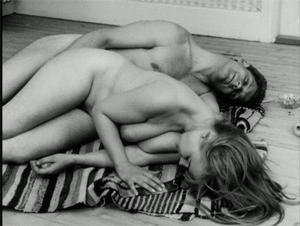
I Am Curious, Yellow
Miriam disagreed, citing a lack of convincing evidence of any “art,” foreign film or not. Max won the day for us by agreeing to chaperon and supervise should anything be inappropriate. So off we went.
Max fell asleep a half-hour into it. I know that Harvey has been quoted in many articles as saying The 400 Blows was one of his favorite foreign-language movies ever, but I can tell you what mine was at that moment in time—I was 13, after all!
There was no chance of my falling asleep. But Harvey was just enough older to watch the movie and notice something else: a packed audience of “art-lovers” who never would have set foot in a movie with subtitles but for the fact there was a little something extra added. It was a lesson that would come into play years later.The WindowMy father was a diamond cutter in New York City’s Diamond District, located on 47th Street between Fifth and Sixth Avenues. For those in the business it was simply known as “the Street.” As New Yorkers and tourists pass by the vast rows of displays, filled with tens of thousands of diamonds in as many cuts and configurations, most rarely notice the floors above these shining windows. In some Jewish-American inversion of class structure, the workers are upstairs on the Street and the owners are down. Each building has hundreds of upper-floor shops where workers and tradesmen put in 10- to 12-hour days transforming raw, unpolished hunks of stone, which would seem like junk to a layman, into polished diamond gems with 56 facets to be sold in the windows and stores below.
In Max’s day, each of the workshops was approximately 800 square feet in size, housing up to eight cutters. Every cutter was provided a stool and a workbench outfitted with a steel wheel lying flush in the center, like a record turntable. When the cutter flipped the electric switch on the side of the bench, this wheel would begin spinning, eventually reaching speeds around 1,800 rotations per minute. The cutter would place the raw gem, dull and grayish, into a lapidary tool called a dop. He would then begin pressing it to the wheel, systematically turning the dop to create the facets that bring out the luster of the stone, and transform it into everyone’s idea of a diamond, white and shining. The work was intense and monotonous, not to mention hard on the back.
It was in these shops that my father spent most of his life, literally and figuratively grinding out a living to support his family. And, more than anything, Max wanted to be on the ground floor. He wanted to be, as he called it, “one of the big boys,” someone who controlled his own destiny, could call the shots for himself, and had status. Striking it rich wouldn’t have been bad, either. Is it any surprise that one of his favorite songs was “If I Were a Rich Man” from Fiddler on the Roof? As he sang it around the apartment, doing his best Zero Mostel imitation, we would all laugh, and so would he—but underneath it was a serious matter for him.
Like a lot of people, he had his dream, but he also had a few plans for achieving it. He was determined to try, and his sons watched it all and learned.It was one thing to have a store on the Street, but even then there was a hierarchy. The main floors typically housed 50 or 60 individually owned booths in which a retailer could exhibit his merchandise to the customers who came in to browse. The ultimate goal was to have a “window”—storefront property where your merchandise could be displayed not just to the people who bothered to open the door and come in but to every passerby on the street. This was the Boardwalk and Park Place. And in the fall of 1965, a window property became available—23 West 47th. The dream was about to become reality.
Over the years, Max had saved around $25,000. This was our rainy-day money, but my father was dreaming of sunshine every day.In Max’s world, there were no I.P.O.’s to raise money, no investor cocktail parties at $1,000 a head. This was small business with big dreams—you saved your money, bought your store, and took your shot.
And he wasn’t investing his nest egg to have just another window full of diamonds—no, he had a plan.
Diamonds combined with jade! It was just what he needed to single himself out, a new product, something the Street hadn’t seen before, and Max was going to corner the market. He imported the finest jade available and set out to design all types of merchandise—rings, earrings, bracelets—all with the moodiness of the deep-green Chinese stone offset by occasional flashes of light from the diamonds.Around this time, sensing that it was harder to go it alone and be successful, he also found himself a partner. With a partner, one person could mind the store while the other hunted up new opportunities. In theory, he was right in every respect. In practice, he got the wrong guy. The man he chose had none of Max’s drive or vision, but was willing to hang on for a ride. My mother, never one to keep an opinion to herself, pointed out these defects repeatedly. My father didn’t listen, but in his heart I believe he knew she was right, and this would come into play years later.
And so the store finally opened. A glorious day—a “premiere.” Max was officially in business! He had moved downstairs and become one of the big boys. And the best part of all was that business was great. His instinct to come up with something new was paying off: the customers were buying his stuff—he had a hit! The store provided a common interest for the whole family. In our apartment, the talk at dinner had changed, and it was wonderful. Every night, we would wait for him to come home to hear how he had done that day. Instead of the drudgery of the daily grind, now the discussions were of actual sales being made and how they had transpired. My brother and I would memorize the percentages and tally up the profits.
Thirty to 40 percent from selling just one $1,800 bracelet meant upwards of $540 take-home—an entire week’s pay in the old days. Harvey and I quickly grew dissatisfied with a pair of earrings being sold for a mere $600, but Max would always remind us that “it all adds up.”
My brother and I asked every question we could think of and soaked up the answers. And one summer day Harvey had an opportunity to prove just how well he had been listening. Max’s partner had the day off, and my father had an appointment and left his 13-year-old son to mind the store. Upon Max’s return, Harvey informed him that he had sold a diamond ring to a woman for $1,200. Stunned, Max turned to the other owners nearby for confirmation. Equally amazed, even after witnessing the transaction, they grudgingly assured Max he had a “supersalesman” in the family.Another incident was in hindsight so full of foreshadowing that “ironic” is too small a word to describe it.
Max returned home from work one day beaming.
“You won’t believe who came in the store today.”
“Who? Who?”
“Mel Brooks!”Now, my father’s absolute favorite movie, and I swear on this, was The Producers. It starred his favorite actor, Zero Mostel; it had a great story; and Mel Brooks was the funniest man alive. And the genius who had made this movie had been in the store! Being the starstruck Jewish family that we were, the first question that occurred to us was: “Did he buy anything?” My father told us that he hadn’t, but he did sign an autograph. Max pulled out a business card and turned it over. On the back was written, “To Max and his two rotten sons—Mel Brooks.” We laughed and it was a cute little story. But cut to 34 years later. I was with my brother on the afternoon of the Academy Awards, the year Shakespeare in Love was in the running for best picture. I asked him if he had a speech written should he win, and he said he didn’t. I told him to write something down, just in case. He quickly scribbled something out and read it back to me. My only suggestion for a change was to use Mel Brooks’s line: instead of thanking his two daughters, thank his “two rotten kids.” It would be different, I assured him, and it would get a laugh. Well, the movie did win, and Harvey—via Mel—did get the laugh.
But the serendipity didn’t end there.
Not long after, Mel Brooks called Harvey to say that he was offering a few people the opportunity to invest in a new Broadway musical he had written based on his film The Producers, and Harvey and I were on the list. Of course, we accepted. Two years later we were fortunate enough to be up onstage with Mel Brooks and the rest of the producers of The Producers, receiving the Tony Award for best new musical—the only award my brother and I have ever won for doing no more than signing a check. Max would have loved it.
During the time he owned the window, my father was happy. He was fulfilling his long-held dream, and work didn’t seem like work anymore now that he was his own man. This lasted for two or three years, but the heady days of the first sales passed, and competition from some of the bigger big boys on the Street increased; Max wasn’t the only one who could buy jade. Gradually, as with so many small businesses, the economic pressure took its toll on Max’s window. It gets difficult to ride out the tough times when you need to make changes but lack the capital to implement them. Business started slowing down and the store couldn’t break even. And the partner Max had sought out for advice, support, collaboration, etc., proved himself to be nothing more than a glorified employee at the end of the day.
The store eventually had to be closed. The lease was not renewed, and the remaining merchandise was sold to the bottom feeders at rock-bottom prices. Max had taken his shot, experienced success and, ultimately, failure, and now he was headed upstairs again, back to grinding out his daily living to keep his family afloat. My brother and I knew how filled with hurt and disappointment Max was, and we watched him accept this with grace and dignity and we loved him for it. One thing we didn’t know at the time was that in Max’s mind this was merely a temporary setback. He had had a taste of success, and as he headed upstairs he was already making plans.The ComebackMax took his next big business shot in the winter of 1971, when I was 17 years old. Harvey had already started college, and I had just graduated from high school six months early, in January. Eight months with nothing to do before I went away to college in the fall sounded like Nirvana, and I was ready to take it easy.
But my father had other plans for me. A new business opportunity had arrived, he had $20,000 saved up in the rainy-day account, and he was taking me with him.
A new product had emerged on the scene, a synthetic diamond marketed under the brand name Diamonair. Each gem was promised to be pure white, with none of the imperfections of real stones. A working-class guy could buy his fiancée or wife a beautiful stone the color and size of a $100,000 real diamond for just $1,000. For the customer, what a bargain! For Max, what an opportunity!
The Street was ready to accept this new merchandise and sell it right alongside the real stuff. And this time my father had come up with a different way in: he wasn’t going to be selling the goods retail in a window on the Street. He was going to get in on the action even earlier by buying the equipment needed to cut the new material, hiring his own workers, setting up a shop, manufacturing the goods, and selling them to the dealers on the Street.Once it came time to hire and train the workers needed to cut the Diamonairs, my father realized he couldn’t afford to hire experienced cutters with families to support, so he came up with an innovative and, in retrospect, a pretty open-minded plan.
He recruited several of my brother’s friends who were still in that one- or two-year limbo that people sometimes fall into between high school and the next step, be it college or career. He trained them and paid them less than a real diamond cutter would make but more money than they could dream of making elsewhere. I, of course, was drafted by my father to be one of his elite crew. So one morning, off I went with Max on the subway into Manhattan. On 47th Street, we met up with a group of guys who looked like the Dirty Dozen by way of the Grateful Dead: five longhaired “hippie types,” in the jargon of the day. I was a little scared of them, but Max saw nothing but his first-ever employees. They turned out to be the greatest, sweetest, hardest-working crew on the Street. I was a young 17, they were 19 and experienced, and working with them I learned a lot more than just how to cut Diamonairs.
My father was a strong but patient teacher, and at the end of six weeks we were all trained. We each made $300 a week—a gold mine for us—and my father was back in business. He would never let pride get in the way of making an honest dollar, so when Max wasn’t out hustling up new customers, he was cutting right alongside us. I can remember looking up from my cutting machine to see my old man down at the other end of the row of benches; in between us were Jerry Garcia, Bob Weir, Telly Savalas, and John Cassavetes.Our shop had the most unusual atmosphere of any on the Street. Most of the manufacturing houses had 8 to 10 employees, usually Hasidic Jews, in the traditional long black coats, white shirts, and yarmulkes, working side by side in almost absolute silence. It wasn’t that they were antisocial; they just seemed to take a Zen-like approach to their job. Maybe that was how they trained their minds to deal with the monotony of the work. By way of contrast,
the shop my father ran was filled nonstop with the music of the Grateful Dead, the Allman Brothers, Pink Floyd, the Who, etc. My father’s occasional request for some Sinatra was always quickly rebuffed. Everyone had his own style, and that was fine with Max, as long as the work got done. That’s what we loved about him, and why the work always did get done.
Some afternoons my father would come back from an appointment and notice a strange aroma wafting from the bathroom. He would ask the guys if they were smoking any of those “funny cigarettes.” They would just smile and my father would move on.
One of the guys once overheard Max on the telephone, obviously in the middle of an argument with my mother. When Max hung up, the guy handed him a joint and advised him to take it home and smoke it later that night with Miriam to “ease the tension.” No kidding—and my father took it. I have no idea what actually happened later (and my mother’s not telling), but it puts a smile on my face to this day to imagine Miriam and Max puffing on a joint together and forgetting the silly problems of the day.
Eventually, it was time for me to head off to college. Max had been holding my $300 a week for me for the whole eight months, so I was looking forward to having a cool nine grand or so to take with me. When it came time to collect, I got the shock of my life: it didn’t exist! Max had used what would have been my salary to buy new equipment for the shop. My own father had “taken” my hard-earned money! Boy, did I scream. Miriam said, “Max, how could you?” His reply? “It needed to be done and that’s that.” The way he saw it, it was a small price for a lifetime of room and board; the business needed it and that was more important. He didn’t feel one ounce of guilt, and in time I had to respect him for doing what he had to for the shop, even if it was with my salary.
The business survived a few more years with the usual ups and downs. Max had hoped to open several shops, but the demand for Diamonairs didn’t last, and his one shop closed down. He tried little business ideas from time to time, but that shop was really his last hurrah, and he settled back into being someone else’s employee. He was approaching 50 and was slowly starting to plan for other things, like traveling with my mother now that both kids were grown and out of the house.
He had no regrets. He had taken his shots, and just knowing he had really tried made him feel that he was successful. He was right.
For me and Harvey, the most important part of all my father’s business ventures was that they gave us an opportunity to work alongside him—for my brother, several summers, for me, eight straight months, side by side. There wasn’t any great advice given or big speeches made, but we had the opportunity to observe him in action day after day. We learned the “business” at the University of 47th Street. No actual school could have taught us what it really takes to run an enterprise. The vision, determination, stamina, hope, relentlessness, and sheer work that are involved in staying afloat, much less succeeding, are the same whether you are running a window on 47th Street or Miramax Films or Microsoft.
The FamilyMax came from a family of nine children and yet felt no closeness to his brothers and sisters and had a distant relationship with his parents, particularly his father. Until he became an adult and created his own family, he felt very much alone. Most times, it seems that the human mind picks one of two ways to deal with a very negative aspect of childhood: either we subconsciously re-create the very situation we hated, or we consciously work very hard to make it different. Well, lucky for Harvey and me, our father was in the latter group, and his family was everything to him, especially the closeness of his sons. And this was not something we inferred or just felt. He told us outright.
It was sometime in 1963. I was seven and my brother was nine. My father called us to him, saying he had something “important” to discuss with us. Our minds began racing to figure out what our infraction had been to get the butt-whipping we were sure was coming. But that wasn’t what Max had in mind. He walked us into the living room and told us to take a seat in the two “club chairs.” Now we really knew something was up, because in our whole lives we had never, never been allowed to sit in these chairs or even look as if the thought of sitting in them might have crossed our mind. The expensive chairs were for “company only” and that was that. So we figured we were dead for sure. We obediently sat in our assigned seats and waited to hear what we had done. But what followed was the only “sit-down” speech my father ever made to me and my brother in our lives.
“I want you both to listen. I have something very important to tell you.”
He proceeded to recount the story of the Kennedy family: how John Kennedy was the president and had picked his brother Bobby to be the attorney general and how their old man, Joe Kennedy, had helped organize the entire election campaign. Joe and his two sons were a lesson in how important family was—if a family worked together, they could accomplish anything. He went on to say that John and Bobby Kennedy were the perfect example of how powerful that bond of family could be and that John had picked Bobby because he knew he could trust him like no other. Then came Max’s greatest leap, a leap that only a dreamer with an innocent purity of belief in the power of his dream could make.
“And you guys can accomplish as much as them. If you stick together, nothing is impossible.”
There it was in one sentence—the prime directive. The secret ingredient had been stirred in. He went on to say that even if someday we ended up not working together we should always look out for each other, no matter what. But the implication remained. Together was better. And with this knowledge imparted, we were dismissed.
Giancana had longtime ties to the Kennedy clan, going back to JFK's father, Joseph P. Kennedy, who was involved with Giancana in the bootlegging business during Prohibition. Additionally,
Gianciana was an associate of singer Frank Sinatra, a close Kennedy friend, and allegedly was a donor to JFK's 1960 Presidential campaign, at a time when politicians weren't required to disclose their deep-pockets contributors.
There also have been allegations that Giancana secretly helped JFK win the 1960 West Virginia primary, in which he bested fellow U.S. Sen. Hubert Humphrey, D-Minn.
In 2009, Tina Sinatra, daughter of Kennedy friend Frank Sinatra, told the TV program "60 Minutes" that the legendary singer—at the behest of JFK's father, Joseph P. Kennedy—approached Giancana. Sinatra allegedly asked Giancana to use mob muscle to pressure local union members to vote for JFK. The request was made through an intermediate, Sinatra, because "it would be in Jack Kennedy's best interest if his father did not make the contact directly," Tina Sinatra explained.In his 1997 book, The Dark Side of Camelot, investigative reporter Seymour Hersh alleged that the elder Kennedy eventually did meet with Giancana in Chicago, to solicit his support for JFK in the general election.
During the Kennedy Administration, the Chicago mobster, along with other crime figures, is known to have been enlisted by the CIA to plot the killing of Cuban leader Fidel Castro.
Giancana and Kennedy also shared a mistress, Judith Campbell Exner, with whom they were involved with at different times (Kennedy first, then the mob boss). In a 1988 People magazine article, Exner claimed that she arranged a meeting between then-Presidential candidate Kennedy and Giancana at the Fontainbleau Hotel in Miami in April 1960 at JFK's request. "I think I may need his help in the campaign," she claimed that Kennedy told her. Subsequently, Exner claimed, she arranged nine other meetings in 1960 and 1961, and personally witnessed at least one of the sit-downs. In addition, Exner later claimed that she carried mysterious envelopes between Kennedy and Giancana.
--
Was Kennedy Tied to the Mob?: Rigged Elections, Shared Mistresses, And An Assassination Plot, by Patrick J. Kiger
“O.K., that’s it. Get out of here.”
The only thought I remember having as we slid out of the hallowed club chairs was how weird my father was. And as we went off to play baseball or football or whatever, Harvey and I didn’t discuss what Max had just said to us. Nor in the years to come did we ever, not once. The sentence “Remember what Dad said about sticking together … ” was never uttered by either of us. Somehow Max took his dream, bypassed our conscious minds, and injected it directly into our DNA.
On June 4, 1976, as he was walking up the front stoop after a day at work, just as he had every other weekday of his adult life, my father died of a sudden heart attack at the age of 52. I was now 22 and my brother was 24. 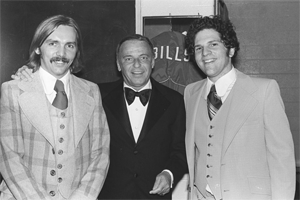
-- Frank Sinatra, center, with Harvey Weinstein, right, and Weinstein business partner Corky in Buffalo on Oct. 4, 1974. Photo by Mickey Osterreicher.
Max had lived to see Harvey achieve a high level of success as a concert promoter in Buffalo, where he put on all kinds of shows, from Frank Sinatra and Bette Midler to the Grateful Dead. And my father had gone to listen to and meet them all, even the Dead.
I had dropped out of college, having set the record for lowest number of credits earned over two years. I then moved to Buffalo to live with my brother and began promoting movie festivals in the theater Harvey owned, to keep the money coming in between live concerts.
One day the rock group Genesis came to perform. They mentioned to my brother that they had a concert film they had made, and asked if he knew anyone who could promote it nationally. He told them his brother, Bob, was the best movie promoter in the country and could easily do the job. At the time, I didn’t know a single theater outside of Buffalo.Thrown into a job you know nothing about with no way out, you learn very fast. Genesis: A Band in Concert, as it was titled, became the first picture we owned together. The seeds were being planted—we just didn’t know it.
Harvey was becoming frustrated with the concert-promotion business, and I was busy doing my thing, but not enjoying doing it alone. The “club-chair conversation” must have been working in both our subconsciouses, because it wasn’t much longer before
Harvey and I set out to start our company for real. I came up with the name in an hour, Harvey approved it in a minute, and Miramax was born.Twenty-five years have passed, and I have so many memories: a hundred Miriam stories, a thousand Harvey stories, and even more Bob-and-Harvey stories. As our company has grown, and continues to grow, and as our families do the same, the stories multiply. But the Max stories stopped on that June day in 1976.
As for you, Max, well, your best “shot,” the one you nurtured all through our childhood, has paid off: your sons are making movies that you would love, they can hold their own with anyone when it comes to business, and they are not only each other’s partner but best friend as well—an alliance that cannot be broken.Bob Weinstein, 62, said that he's barely spoken to his brother in the past five years. He emphasized that he was not aware of his brother's alleged sexual misconduct but instead thought Harvey Weinstein was engaged in adultery with one woman after another.
"I could not take his cheating," he said, referring to Harvey Weinstein's marriage to wife Georgina Chapman, "his lying and also his attitude toward everyone."
With the allegations now made against Harvey Weinstein, Bob Weinstein said, "My brother has caused unconscionable suffering ... I want him to get the justice that he deserves."
-- Bob Weinstein says 'sick and depraved' brother Harvey Weinstein abused him, by Joi-Marie McKenzie
You also have four grandchildren: my two daughters, aged 22 and 17, and Harvey’s daughters, aged 7 and 4. And rest assured, both sets of sisters hear all the stories of Grandpa Max, and there are two important lessons from their grandfather that we will always keep alive: that they are each other’s greatest ally, and that their hair always “looks great.”








